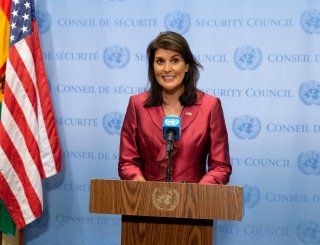Is Nikki Haley Too Hawkish for the GOP?
The former UN ambassador is going up against her old boss for the Republican presidential nomination.
Nikki Haley isn’t cowering before Donald Trump. Unlike other potential Republican contenders, Haley is trying to demonstrate her mettle by getting in the ring with him right away. Can she deck him?
Trump may be the GOP frontrunner, but he looks wobbly. He’s mired in a variety of lawsuits and potential indictments, ranging from New York to Georgia. Even Stormy Daniels is back. Then there is his Potemkin campaign for the presidency. Trump, whose speeches have been lackluster, has not demonstrated that he can recapture the mojo that propelled him to victory in 2016.
As the former governor of South Carolina, Haley would appear to be well-positioned to capture the state in the Republican primaries. Her appeal to independent voters and suburban women is assuredly more potent than Trump’s. She would be the first woman and non-white candidate to secure the nomination. In 2015, Haley signed a bill that hauled down the Confederate battle flag from the state capitol. But she also made sure to campaign for candidates who backed Trump’s bogus election fraud allegations. Still, she is politically ambidextrous enough to point to the fact that Trump’s record in the midterm elections, when Republicans failed to capture the Senate and lost key governorships, can hardly be termed as anything but abysmal.
But in jabbing at Trump, it is her old job as United Nations ambassador that may actually come to the fore. Like former Secretary of State Mike Pompeo, who also sees himself as presidential timber, Haley represents the Republican old guard, at least when it comes to foreign policy. Put otherwise, she is a foreign policy hawk who has never made the least effort to disguise her plumage. She was UN ambassador when Trump exited the Iran nuclear deal, the bête noire of the right as it was signed by Barack Obama.
The issue that could sunder the Republican party in the upcoming election is Ukraine. Support for the war is eroding, at least among Republicans. America has spent over $27 billion in military aid over the past year for Ukraine. According to a new Pew Charitable Trust poll, the share of adults who believe that America is providing excessive aid to Ukraine has grown by six percentage points since last September. Right now, 40 percent of Republicans and Republican-leaning independents say that America is doing too much.
Former British prime minister Boris Johnson is currently visiting America to try and drum up support for the war and, incidentally, to boost his own political prospects back home. Much like Trump, he wants another go at high office. But unlike Trump, who has been blasting away at Ukraine, claiming he could solve the war “within twenty-four hours,” most likely by handing Kyiv over to Russian president Vladimir Putin on a silver platter, Johnson is pleading with House Republicans to remain steadfast. As Alistair Dawber reports, Johnson is meeting today with the House Republican Study Committee. But convincing recalcitrant Republicans to back Ukraine could make Brexit look like a tea party.
William Ruger, president of the American Institute for Economic Research, said:
Republicans are going to have to work out for themselves in the midst of a primary campaign whether they want to return to the approach of George W. Bush, [which] people like Haley represent, or something closer to where Trump was headed in breaking the status quo in the party and opening up debate about what America First ought to entail. The Ukraine debate on the Right highlights the tensions in the party right now. If establishment hawks like Haley, Pence, and Pompeo jump into the race, this will provide an opportunity for Trump or DeSantis or another candidate to differentiate themselves and speak for Americans who liked the idea of ending endless wars and putting our vital interests first. It certainly helped Trump in 2016 to do so.
The blunt truth is that the GOP may be moving further away from its traditional hawkish positions. Whether Trump can capitalize on this trend is an open question. But he will almost surely try to deploy it as a battering ram against his Republican opponents. A battle royale may be about to begin in the GOP over America’s commitments abroad.
Jacob Heilbrunn is editor of The National Interest.
Image: Lev radin/Shutterstock.com

